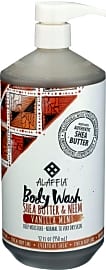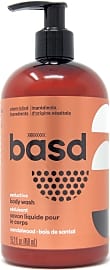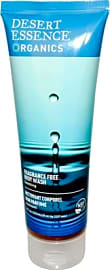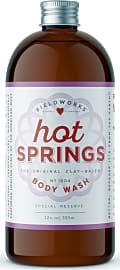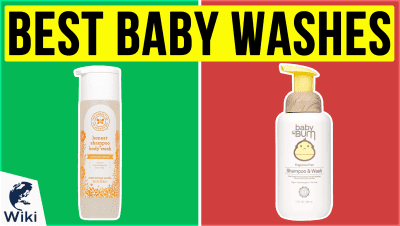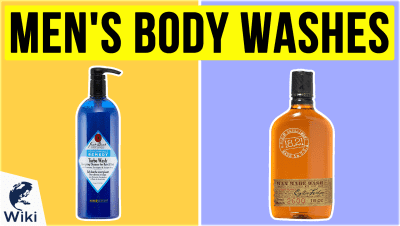The 10 Best Natural Body Washes

This wiki has been updated 38 times since it was first published in January of 2018. What we put on our skin impacts our health nearly as much as what we put inside our bodies, which is why it's important to use products that are free of harmful ingredients. While there is no official standard for the term "natural," in selecting our natural body washes, we looked for mostly plant-derived formulas and made sure to avoid known toxins, like parabens and artificial dyes. When users buy our independently chosen editorial selections, we may earn commissions to help fund the Wiki.
Editor's Notes
May 21, 2020:
In selecting the body washes on this list, we were very diligent about checking what ingredients they both had and didn't have. We wanted formulas that would offer some skin health benefits in addition to having good cleansing abilities. We also wouldn't allow any products to stay that contained known irritants. On that note, we removed Calily Life Tea Tree because it has DMDM hydantoin, a preservative known to release formaldehyde. Nourish Moisturizing Cream contains alcohol denat, which can lead to dryness and irritation, so it had to go, too.
As for body washes offering much-appreciated perks, we like that Carina Organics Citrus Daily has tangerine oil that some believe may help fight acne, and that Puracy Citrus & Sea Salt has grapefruit extract, which is claimed to help combat blemishes. We eliminated Trillium Lavender Geranium Body Polish as it's quite sticky and can cause breakouts for some.
Those looking to heal skin damage will like Avalon Organics Nourishing Lavender Bath & Shower Gel, with its lime oil that may, potentially help lighten dark spots, and The Seaweed Bath Co. Lavender, which the company states should help boost elasticity.
We wanted to make sure those with truly sensitive skin and allergies could find something here, so we like that Dr. Bronner’s Pure-Castile Liquid Soap has a short ingredient list, full of items most of us recognize. With skin allergies in mind, Original Sprout lost its place as it causes reactions for some. We also removed Nature's Baby Coconut Pineapple, not for any true flaws, but simply because it is for little ones, and we only wanted to include products strong enough for adult skin, because baby washes have their own dedicated list.
Special Honors
Skylar Isle Body Wash Skylar Isle Body Wash creates an excellent foam that makes it work just as well as a shave gel as it does for cleansing the body. It has hyaluronic acid, which is supposed to help your skin maintain its natural moisture and better absorb other products, while its coconut oil and shea butter are said to further improve hydration. The fresh scent might remind you of the beach, and its ingredient list contains mostly plant-derived items. skylar.com
Goop G.Day Ginger + Ashwagandha Energy Body Wash Thanks to the two namesake ingredients in Goop G.Day Ginger + Ashwagandha Energy Body Wash, some believe it may protect against free radical damage while also slowing the aging process by firming up the skin. Also, Goop is known for its activism against the toxins that are under-regulated in American skin care products, so you can rest assured they focus on making skincare products that won't cause harm. goop.com
Why Go Organic?
But why bother with an organic body wash, when inorganic products are much cheaper, and appear to be superior in terms of lather and effectiveness?
There’s a good chance that you’ve been using soap of some kind to keep your body clean for most of your life. You may have used bar soap for a time, but if you’re perusing this list, than you’re at least interested in utilizing some form of body wash. But why bother with an organic body wash, when inorganic products are much cheaper, and appear to be superior in terms of lather and effectiveness?
Well, for starters, that apparent superiority comes at a cost. Before we get into that cost however, we need to dispute this idea of superiority. A lot of inorganic and chemically assembled body washes (and other shower products) utilize some shady ingredients to make their solutions lather up. Most common among these is sodium lauryl sulfate. This is an ingredient that’s more or less guaranteed to give you a good lather, and everybody loves a good lather. What everybody doesn’t love unfortunately also accompanies this ingredient, namely an increased risk of cancer, neurological and organ toxicity, skin and eye irritation, and endocrine issues.
And that’s just one suspect ingredient.
But there are natural products out there that don’t contain suspicious chemicals and that are also not certified organic, so what’s wrong with these? Well, the answer is that less is wrong with them, but that they still have their problems. It’s important to remember that your skin is a semi-permeable organ, which means that plenty of chemicals have the potential to pass through it and enter our other systems.
That means that any chemicals used in the fertilization and tending of any natural ingredients in your body wash — including all herbicides and pesticides — can easily make their way into the wash itself, and then into your body, putting you at risk for all manner of ailments down the line. At the end of the day, all the reasons you know that people prefer organic fruits and vegetables apply to your body wash, as well.
Choosing Your Organic Body Wash
As you set out to choose the perfect organic body wash for your shower, you might find that there are certain limitations to getting the product online. Specifically, you can’t smell it. On the plus side, customer reviews tend to focus on the aroma of a given body wash, so you can gather a lot of information from there if you need to. We certainly have.
Not only does this ingredient help soothe the skin, it also has a very pleasant, almost minty smell.
It’s important that you get a good sense of your physical needs when picking up a new body wash. For example, if you know that your skin tends toward dryness, it’d be smart to look for a brand that features a number of moisturizing ingredients. These might include aloe or shea butter to name a few. If you’re worried about irritation, whether from dryness or a reaction to another ingredient, look for soothing ingredients like tea tree oil. Not only does this ingredient help soothe the skin, it also has a very pleasant, almost minty smell.
While you’re at it, keep an eye on the construction of the bottle, as well. You’re liable to see two types of bottle cap dominating the market: flip-up caps and pumps. This comes down to personal preference, but generally speaking, pumps are easier to use than flip-up caps until you get down to about the last 15 or 20 percent of a body wash. At that point, a pump might have a hard time generating suction, where a bottle with a flip-up can easily be turned over to get everything out.
What Would Happen If You Stopped Showering?
For most people, the shower is a kind of refuge. Under a continuous flow of warm water, we find ourselves temporarily removed from the hustle and bustle of the day. Our phones are at least a room away, and we’re left to freely think whatever thoughts come to us, and to let them go just as easily. It’s long been held that the shower is a place where our most inspired thoughts sometimes find us, but in today’s world, it may be one of the few spaces where any of our thoughts can find us.
That raises an interesting question: What would happen if you stopped showering?
Sometimes, however, a shower isn’t available to us, or we simply don’t have the time to jump in and get a good wash. That raises an interesting question: What would happen if you stopped showering? Well, from an ecological standpoint, you might save a lot of water, but would it be worth the cost to your hygiene?
After the first 24-48 hours, you might not notice any negative consequences of not showering. You might even feel that your hair is a little more manageable than it was before, especially if you’d been in the habit of shampooing daily, as now it’s had time to reset itself and replenish itself with its own natural oils. That golden age will not last, however.
By day three, you’ll likely begin to notice your own stench rising, and you may even experience some itchy, irritated skin. At this point, your body has begun to accumulate some bacteria and dead skin cells that normally would have gone down the drain, but instead, are stuck on your body. They aren’t enough to cause significant harm (yet), but they might begin to turn people away from your general direction.
If that still sounds livable, give it another week, and you’ll find a variety of grotesque rashes, sores, and other physical ailments popping up all over your skin. At this point, your skin will either start to become too dry or too oily, depending a lot on your genetics. Either way, your flesh will become a breeding ground for more aggressive strains of yeast and bacteria.
A month in, and you’ll be susceptible to all manner of infections, especially in the groin and underarms, moist areas where the worst of the bacterial and fungal strains are destined to accumulate.
Will any of this kill you? No, at least not directly. But if you were to go long enough without showering, and then suffer even a minor cut, that wound would become a tremendous risk for serious infections, and depending on where the cut is and how deep it goes, it could lead to amputation.




